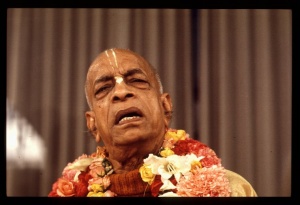SB 2.9.40: Difference between revisions
m (1 revision(s)) |
(Vanibot #0018 edit: make synonym terms in Sanskrit italic in SB - Vanisource) |
||
| Line 1: | Line 1: | ||
{{info | {{info | ||
|speaker= | |speaker=Śukadeva Gosvāmī | ||
|listener=King | |listener=King Parīkṣit | ||
}} | }} | ||
[[Category:Srimad-Bhagavatam - Canto 02 Chapter 09]] | |||
[[Category:Bhagavatam Verses Spoken by Sukadeva Gosvami - Vanisource|020940]] | |||
<div style="float:left">'''[[Srimad-Bhagavatam]] - [[SB 2|Second Canto]] - [[SB 2.9: Answers by Citing the Lord's Version|Chapter 9: Answers by Citing the Lord's Version]]'''</div> | |||
<div style="float:right">[[File:Go-previous.png|link=SB 2.9.39]] '''[[SB 2.9.39]] - [[SB 2.9.41]]''' [[File:Go-next.png|link=SB 2.9.41]]</div> | |||
{{RandomImage}} | |||
==== TEXT 40 ==== | ==== TEXT 40 ==== | ||
<div | <div class="verse"> | ||
prajāpatir dharma-patir | :prajāpatir dharma-patir | ||
ekadā niyamān yamān | :ekadā niyamān yamān | ||
bhadraṁ prajānām anvicchann | :bhadraṁ prajānām anvicchann | ||
ātiṣṭhat svārtha-kāmyayā | :ātiṣṭhat svārtha-kāmyayā | ||
</div> | </div> | ||
| Line 16: | Line 22: | ||
==== SYNONYMS ==== | ==== SYNONYMS ==== | ||
<div | <div class="synonyms"> | ||
prajā- | ''prajā-patiḥ''—the forefather of all living entities; ''dharma-patiḥ''—the father of religious life; ''ekadā''—once upon a time; ''niyamān''—rules and regulations; ''yamān''—principles of control; ''bhadram''—welfare; ''prajānām''—of the living beings; ''anvicchan''—desiring; ''ātiṣṭhat''—situated; ''sva-artha''—own interest; ''kāmyayā''—so desiring. | ||
</div> | </div> | ||
| Line 23: | Line 29: | ||
==== TRANSLATION ==== | ==== TRANSLATION ==== | ||
<div | <div class="translation"> | ||
Thus once upon a time the forefather of living entities and the father of religiousness, Lord Brahmā, situated himself in acts of regulative principles, desiring self-interest for the welfare of all living entities. | Thus once upon a time the forefather of living entities and the father of religiousness, Lord Brahmā, situated himself in acts of regulative principles, desiring self-interest for the welfare of all living entities. | ||
</div> | </div> | ||
| Line 30: | Line 36: | ||
==== PURPORT ==== | ==== PURPORT ==== | ||
<div | <div class="purport"> | ||
One cannot be situated in an exalted position without having undertaken a regulative life of rules and regulations. An unrestricted life of sense gratification is animal life, and Lord Brahmā, in order to teach all concerned within the jurisdiction of his generations, taught the same principles of sense control for executing higher duties. He desired the welfare of all as servants of God, and anyone desiring the welfare of the members of his family and generations must conduct a moral, religious life. The highest life of moral principles is to become a devotee of the Lord because a pure devotee of the Lord has all the good qualities of the Lord. On the other hand, one who is not a devotee of the Lord, however qualified he may be in the mundane sense of the term, cannot be qualified with any good quality worthy of the name. The pure devotees of the Lord, like Brahmā and persons in the chain of disciplic succession, do not do anything to instruct their subordinates without acting accordingly themselves. | One cannot be situated in an exalted position without having undertaken a regulative life of rules and regulations. An unrestricted life of sense gratification is animal life, and Lord Brahmā, in order to teach all concerned within the jurisdiction of his generations, taught the same principles of sense control for executing higher duties. He desired the welfare of all as servants of God, and anyone desiring the welfare of the members of his family and generations must conduct a moral, religious life. The highest life of moral principles is to become a devotee of the Lord because a pure devotee of the Lord has all the good qualities of the Lord. On the other hand, one who is not a devotee of the Lord, however qualified he may be in the mundane sense of the term, cannot be qualified with any good quality worthy of the name. The pure devotees of the Lord, like Brahmā and persons in the chain of disciplic succession, do not do anything to instruct their subordinates without acting accordingly themselves. | ||
</div> | </div> | ||
__NOTOC__ | |||
<div style="float:right; clear:both;">[[File:Go-previous.png|link=SB 2.9.39]] '''[[SB 2.9.39]] - [[SB 2.9.41]]''' [[File:Go-next.png|link=SB 2.9.41]]</div> | |||
__NOTOC__ | |||
__NOEDITSECTION__ | |||
Revision as of 16:27, 30 November 2017

A.C. Bhaktivedanta Swami Prabhupada
TEXT 40
- prajāpatir dharma-patir
- ekadā niyamān yamān
- bhadraṁ prajānām anvicchann
- ātiṣṭhat svārtha-kāmyayā
SYNONYMS
prajā-patiḥ—the forefather of all living entities; dharma-patiḥ—the father of religious life; ekadā—once upon a time; niyamān—rules and regulations; yamān—principles of control; bhadram—welfare; prajānām—of the living beings; anvicchan—desiring; ātiṣṭhat—situated; sva-artha—own interest; kāmyayā—so desiring.
TRANSLATION
Thus once upon a time the forefather of living entities and the father of religiousness, Lord Brahmā, situated himself in acts of regulative principles, desiring self-interest for the welfare of all living entities.
PURPORT
One cannot be situated in an exalted position without having undertaken a regulative life of rules and regulations. An unrestricted life of sense gratification is animal life, and Lord Brahmā, in order to teach all concerned within the jurisdiction of his generations, taught the same principles of sense control for executing higher duties. He desired the welfare of all as servants of God, and anyone desiring the welfare of the members of his family and generations must conduct a moral, religious life. The highest life of moral principles is to become a devotee of the Lord because a pure devotee of the Lord has all the good qualities of the Lord. On the other hand, one who is not a devotee of the Lord, however qualified he may be in the mundane sense of the term, cannot be qualified with any good quality worthy of the name. The pure devotees of the Lord, like Brahmā and persons in the chain of disciplic succession, do not do anything to instruct their subordinates without acting accordingly themselves.